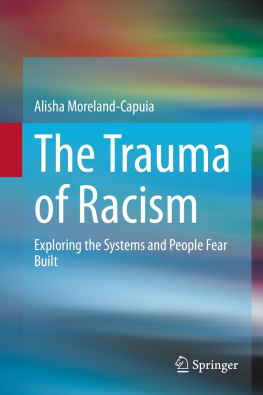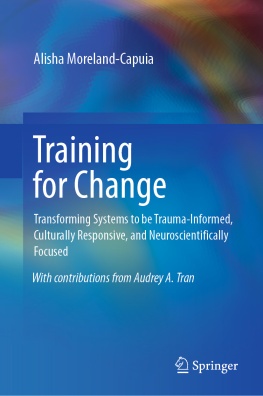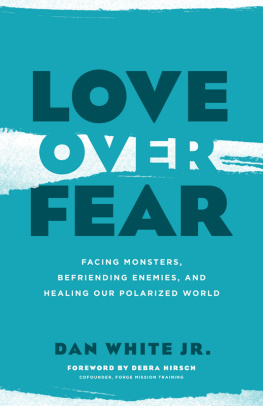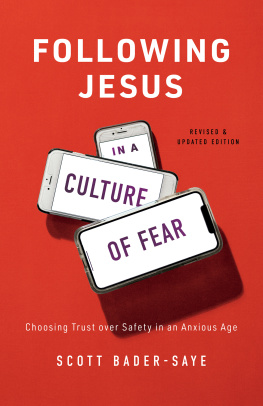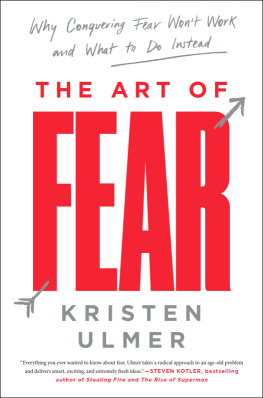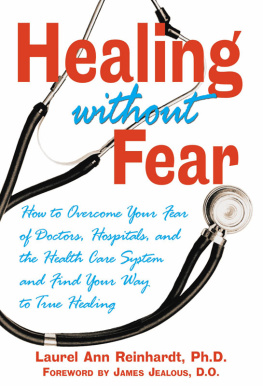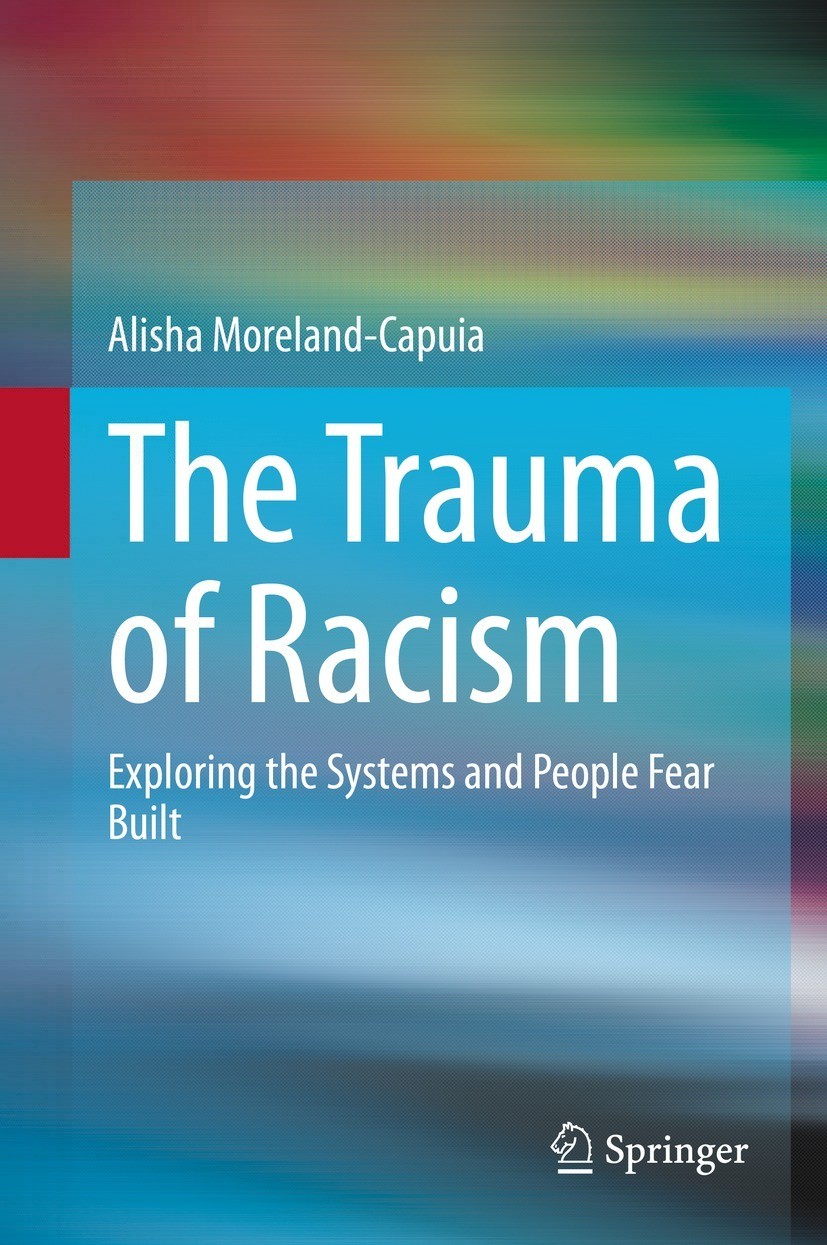Alisha Moreland-Capuia
The Trauma of Racism
Exploring the Systems and People Fear Built
1st ed. 2021

Logo of the publisher
Alisha Moreland-Capuia
Psychiatry, McLean Hospital-Harvard Medical School., Belmont, MA, USA
ISBN 978-3-030-73435-0 e-ISBN 978-3-030-73436-7
https://doi.org/10.1007/978-3-030-73436-7
The Editor(s) (if applicable) and The Author(s), under exclusive license to Springer Nature Switzerland AG 2021
This work is subject to copyright. All rights are solely and exclusively licensed by the Publisher, whether the whole or part of the material is concerned, specifically the rights of translation, reprinting, reuse of illustrations, recitation, broadcasting, reproduction on microfilms or in any other physical way, and transmission or information storage and retrieval, electronic adaptation, computer software, or by similar or dissimilar methodology now known or hereafter developed.
The use of general descriptive names, registered names, trademarks, service marks, etc. in this publication does not imply, even in the absence of a specific statement, that such names are exempt from the relevant protective laws and regulations and therefore free for general use.
The publisher, the authors and the editors are safe to assume that the advice and information in this book are believed to be true and accurate at the date of publication. Neither the publisher nor the authors or the editors give a warranty, expressed or implied, with respect to the material contained herein or for any errors or omissions that may have been made. The publisher remains neutral with regard to jurisdictional claims in published maps and institutional affiliations.
This Springer imprint is published by the registered company Springer Nature Switzerland AG
The registered company address is: Gewerbestrasse 11, 6330 Cham, Switzerland
This book is dedicated to my husband and children who are a boundless, relentless source of inspiration, motivation, and hope for me. They support my core belief that I am here on this earth to do good, serve others, and reduce human suffering. My love and gratitude for them run wide and deep.
Book Description
2020 has been uniquely challenging with the COVID-19 pandemic and heightened racial tension in the context of a tumultuous geopolitical environment. Within a year, a multicultural, multigenerational coalition came together to tackle the COVID-19 pandemic with the construction of a vaccine and a commitment to continued learning and adjustment to prevent needless death from the disease. Meanwhile, the persistent pandemic of racism, which is preventable, rages and ravages whole communities, systems, and societies. Because racism is systemic and structural, the approach to dismantling must also be systemic and structural. Racism is a form of trauma. Because trauma is perpetuated systemically and structurally, healing must be facilitated systemically and structurally. This book explores the intersection of history, philosophy, politics, psychology, neurobiology, and the role of fear in influencing traumatic structural-systemic racism. This book respectfully challenges the reader to identify individual, systemic, and societal fear, fear-on-fear interactions and their relationship to the trauma of racism. Finally, Chapter 10, the last chapter of this book, highlights three African countries, Angola, Kenya, and South Africa, and the deleterious and traumatic impact of colonialism, civil war, European supremacy, and each countrys respective path toward truth, reconciliation, and healing. This book is for any person, system, or society that is ready to identify fear and temper it; acknowledge, contain, and treat the persistent pandemic of racism; and poised to make a commitment to continued learning and adjustment to prevent needless death from racism and steadfast in a desire to facilitate healing.
Acknowledgments
I am so incredibly grateful to my husband Daniel Capuia for his unwavering support of me in writing this book. His global perspective, value of global community, and his unwavering commitment to help his native country of Angola, Africa, have been and continue to be a rich source of motivation and inspiration for me and my work. Thank you to my children who challenge, teach, and love me deeply, and I am so blessed to be their mother and hope that I can continue to make them proud. To my family, friends, community, and mentors, thank you so much for your continued belief in me. From my King Elementary School days in NE Portland, I hold fast and live out this part of the schools daily pledge that read: If it is to be, it is up to me. To whom much is given, much is expected, a responsibility I take seriously.
Special thank you to Jaime Vilasanta and Daniel Capuia for helping me to think thoughtfully through the chapter in this book on Angola, Africa. Thank you to my mentor Dr. Kerry J. Ressler, M.D., Ph.D., at McLean Hospital/Harvard Medical School for his boundless wisdom and support of my scholarship and humanity.
I am so grateful to be working with the bold and brilliant illustrator Audrey A. Tran once more. Audrey, you are amazing. Your illustrations tell stories through art and articulate so clearly and profoundly that which cannot be adequately articulated verbally. Thank you.
About the Illustrator
Audrey A. Tran received her B.A. at Wellesley College, magna cum laude, in biochemistry with a minor in music. She then worked as a research assistant in Boston, MA, and became enamored with stem cell and CRISPR genome editing technology. She matriculated into medical school in 2017 and completed her masters degree in clinical research in 2020.
Her passion for science is coupled with a drive to share what she has learned through creative approaches. This led her to develop a style of tutoring that incorporates intuitive, illustrative, and color-coded study guides, which are now permanently housed in the OHSU Library Archives. She has been recognized by her peers and faculty for her illustrations and is now working with OHSU faculty to develop illustrative videos for patient education.
She is committed to advancing racial justice and believes that education is the first step to empowerment, self-actualization, and effective advocacy. To stay creative, she writes music, and is working on producing an album chronicling her experiences in medical school. She can likely be found harmonizing to your favorite song.
Contents
About the Author
Alisha Moreland-Capuia
(Dr. AMC) graduated from Stanford University in 2002 with a B.S. in biological sciences and a minor in urban studies. She earned her Doctor of Medicine from the George Washington University School of Medicine in 2007. She completed 4 years of psychiatry residency and an addiction fellowship at Oregon Health and Science University. She is board certified in addiction and general adult psychiatry and is currently faculty at McLean Hospital-Harvard Medical School.
She is an expert in trauma-informed systems change and has worked with multiple systems to include education, not-for-profit organizations, clinics and hospitals, and government and community-based organizations to facilitate trauma-informed change. She has committed significant time and effort to facilitating trauma-informed change in various aspects of the criminal justice and government. She has served on the Portland Community Oversight Advisory Board, charged with monitoring the implementation of the City of Portlands settlement agreement with the U.S. Department of Justice to enact reform to Portland Police Bureau (PPB) policies and training. She has partnered with the Federal Judicial Center and the National Judicial College to provide training for Federal Judges and Probation Officers and State Supreme Court Judges, respectively.

